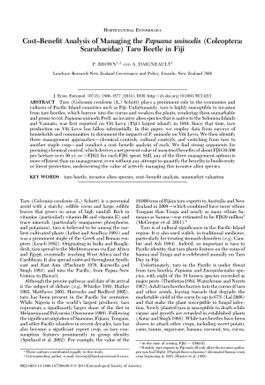Cost-benefit analysis of managing the Papuana uninodis (Coleoptera: Scarabaeidae) Taro beetle in Fiji
- Description:
- Taro (Colocasia esculenta (L.) Schott) plays a prominent role in the economies and cultures of Pacific Island countries such as Fiji. Unfortunately, taro is highly susceptible to invasion from taro beetles, which burrow into the corms and weaken the plants, rendering them unmarkable and prone to rot. Papuana uninodis Prell, an invasive alien species that is native to the Solomon Islands and Vanuatu, was first reported on Viti Levu (Fiji's largest island) in 1984. Since that time, taro production on Viti Levu has fallen substantially. In this paper, we employ data from surveys of households and communities to document the impacts of P. uninodis on Viti Levu. We then identify three management approaches-chemical controls, cultural controls, and switching from taro to another staple crop-and conduct a cost-benefit analysis of each. We find strong arguments for pursuing chemical control, which derives a net present value of monetised benefits of about FJ$139,500 per hectare over 50 yr, or >FJ$21 for each FJ$1 spent. Still, any of the three management options is more efficient than no management, even without any attempt to quantify the benefits to biodiversity or forest protection, underscoring the value of actively managing this invasive alien species.
- Display date:
- 2014
- Collections:
- Secretariat of the Pacific Regional Environment Programme (SPREP)
- Publisher:
- Entomological Society of America
- Content partner:
- Secretariat of the Pacific Regional Environment Programme (SPREP)
- Availability:
- Not specified
-
Copyright status: All rights reservedFind out more about what you are able to do with this itemThis item is all rights reserved, with means you'll have to get permission from Secretariat of the Pacific Regional Environment Programme (SPREP) before using it. For more information, please see our use and reuse page.What can I do with this item?Non-infringing useNZ copyright law does not prevent every use of a copyright work, and this item may be hosted by an international institute or organisation. You should consider what you can and cannot do with a copyright work.No sharingYou may not copy and/or share this item with others without further permission. This includes posting it on your blog, using it in a presentation, or any other public use.No modifyingYou are not allowed to adapt or remix this item into any other works.No commercial useYou may not use this item commercially.
Related items
Welcome and warm Pasifik greetings
The information on this site has been gathered from our content partners.
The names, terms, and labels that we present on the site may contain images or voices of deceased persons and may also reflect the bias, norms, and perspective of the period of time in which they were created. We accept that these may not be appropriate today.
If you have any concerns or questions about an item, please contact us.
